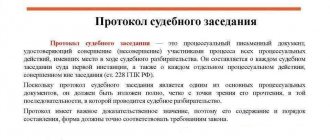Commentary on Article 194 of the Code of Civil Procedure of the Russian Federation
1. In the process of considering civil cases, the justice body resolves various issues, which is the implementation of judicial power. Externally, the latter is expressed in judicial acts, which are generally called judicial decisions. Depending on the content of the issue being resolved, in accordance with civil procedural legislation, the court of first instance issues decisions of three types: decisions, court orders and determinations (Article 13 of the Code of Civil Procedure of the Russian Federation).
The decision of the court of first instance, which resolves the case on its merits, is issued in the name of the Russian Federation in the form of a decision (Part 1 of Article 194 of the Code of Civil Procedure of the Russian Federation).
Rulings can formalize the court's resolution of a variety of procedural issues that arise in the course of the administration of justice (for example, when preparing a case for trial, when postponing trial, when replacing an inappropriate defendant with a proper one, when securing a claim, terminating proceedings, etc. .).
A special type of court decision (judicial act) is a court order, which by its legal nature cannot be equated to a court decision and determination, since it is not decided regarding the adversarial resolution of a civil case or its individual issues. A court order refers to executive documents and is issued without filing a claim, initiating civil proceedings or trial (see Article 12 of the Federal Law “On Enforcement Proceedings” and commentary on Chapter 11).
A common feature of a court decision, court order and determination is that they all contain an expression of the will of the state represented by the court.
The difference between a court decision and a determination is as follows:
— justice is administered through a court decision, i.e. a subjective substantive right or legally protected interest is protected. The definition as a judicial act does not affect the substance of the case;
- a court decision is the final judicial act in the court of first instance, which always ends the judicial consideration of the case.
As an exception, legal proceedings in the court of first instance end with a ruling, not a decision (see comments to Articles 220 and 222).
For each case, the court must make one decision. However, the legislation provides for the possibility of the court making so-called interim decisions. For example, if, when considering a civil claim in a criminal proceeding, it is difficult to calculate the amount to be recovered under such a claim, without postponing the criminal proceedings or without obtaining additional materials, the court may recognize the right of the victim (civil plaintiff) to satisfy the claim and transfer it to the appropriate court to determine the amount of the sought claim in civil proceedings.
The verdict in this case, in terms of recognition of the victim’s right to satisfy the claim, is an interim decision. An interim decision can be made by the court when considering a case for compensation for damage in connection with damage to the health of a person who has not reached the age of majority (Article 1087 of the Civil Code of the Russian Federation).
A judicial decision is an important act of justice, therefore the legislator sets clear requirements for the procedure for making a decision, its content and form.
2. The court decision is made in the deliberation room. This requirement must be strictly observed, since violation of the secrecy of a meeting of judges is an absolute basis for canceling a decision (clause 7, part 4, article 330 of the Code of Civil Procedure of the Russian Federation). Noteworthy is the slightly different approach of the APC to the issue of the procedure for making a decision by the arbitration court. So, in accordance with Part 3 of Art. 167 of the APC, the decision is made by judges participating in the court session under conditions that ensure the secrecy of the meeting of judges. Consequently, arbitration courts do not require a separate specially equipped room. But, just as in courts of general jurisdiction, the secrecy of the meeting of judges is guaranteed by the obligation of judges to maintain the secrecy of the discussions that took place when making a decision.
In accordance with Part 3 of Art. 194 of the Code of Civil Procedure of the Russian Federation, judges cannot disclose opinions expressed during the meeting.
In the theory of civil procedural law, the opinion was expressed that violation of the secrecy of a meeting of judges should entail the reversal of a court decision if this violation occurred during its adoption. If, after the decision was made, judgments that took place at the time the decision was made were disclosed, the grounds for canceling the decision do not apply, since “there can be no talk of any influence on the will of the judges and the independence of the judges was ensured at the time the decision was made” <1>. ——————————— <1> See: Commentary on the Civil Procedure Code of the RSFSR: Scientific and practical. a comment. M., 2001. P. 411.
It seems that in this case one should be guided by Part 3 of Art. 194 of the Code of Civil Procedure of the Russian Federation, according to which “...judges cannot disclose judgments expressed during the meeting.” There is no doubt that the above wording, which contains a categorical requirement to keep secret the opinions expressed in the deliberation room regarding the decision being made, also applies to the time after its announcement.
3. A collegial meeting of judges takes place in the manner prescribed by Art. 15 Civil Procedure Code.
Civil Procedure Code or CAS: the problem of jurisdiction
Consider the case administratively or civilly? – such a question may arise before the courts, which are faced with cases of unclear jurisdiction. The rules here are formulated very abstractly, so judges interpret them in their own way and can make different decisions on similar disputes. The Supreme Court explained why courts should accept applications with incorrect jurisdiction and correct the error themselves, rather than dismiss the case. He also resolved a case in which lower authorities refused to accept the plaintiff’s application under both the Civil Procedure Code and the CAS. And lawyers spoke about the procedural difficulties of choosing between administrative and civil proceedings. Until September 15, 2015, it was possible to appeal against acts, decisions or actions of government authorities in civil proceedings, but in a special manner - according to Chapter. 24 and 25 of the Civil Code. Now almost all such claims fall under the Code of Administrative Offences. At the same time, according to the rules of civil procedure, the court evaluates those acts from which civil rights and obligations arise - for example, when a person receives the right to any property. Such clarifications are given in paragraph 1 of the Resolution of the Plenum of the Supreme Court dated September 27, 2021 No. 36 “On some issues of the application of the CAS of the Russian Federation by courts.”
Difficult choice
The rules are formulated very abstractly, and there are few specific decisions from the Supreme Court, says legal partner Ainur Yalilov . Therefore, judges may be hesitant about the order in which to consider a case. Controversial situations arise when one case has both administrative and civil components, says Yuriy Pustovit, partner of Yug Law . “For example, by order of the local administration, a building was demolished, which it considered an unauthorized construction - here the civil right of ownership was violated, but it was violated in accordance with the administrative act of the government authority,” Pustovit gives examples. “Or the area of the site has decreased due to illegal amendments by Rosreestr: property rights have also been violated, but the court will have to assess the legality of the officials’ actions.”
According to Yalilov, each judge tries to interpret the Supreme Court’s clarifications independently in order to apply them in a particular case. As a result, two judges may make different procedural decisions on similar issues. Courts of general jurisdiction mistakenly classify administrative cases as civil, and this problem is systemic in nature, notes Infralex lawyer Mikhail Gusev .
If the court concludes that the claims were filed in the wrong order, it issues a ruling to refuse to accept the claim or administrative claim. If the judge has doubts, it is more convenient for him to refuse: in this case, an appeal may be made on the controversial issue. After all, cancellations of rulings, as a rule, do not affect the judge’s overall statistics, says Yalilov. If the judge accepted for consideration a dispute that was resolved in an improper proceeding, then this is already a very serious violation, the lawyer explains.
It is also possible that the error is not corrected, and the dispute is considered in violation of the rules of jurisdiction. Choosing the wrong type of legal proceedings creates great problems for the plaintiff due to the different principles of civil and administrative proceedings. In the first case, they proceed from the equality of the plaintiff and the defendant, who have similar procedural rights. In the second case, the citizen is given more rights, and the government agency has more responsibilities, and the burden of proof is distributed accordingly. If an administrative dispute was resolved according to civil rules, it means that the citizen was deprived of the procedural rights and opportunities that are due to him by law. Mistakes here also lead to the case being considered by another court, says Yalilov. If the case concerns land plots, then, when you are forced to file a claim in civil proceedings, you will need to address it at the location of the plot, says the lawyer, while an administrative claim is filed at the location of the government authority.
You can't argue endlessly
Citizens should not suffer from the doubts of courts that do not know which forum to decide a case, the Supreme Court said in a recent case. Yuri Zhilin* decided to challenge the refusal of the local administration to allocate a garden plot to him. At first he filed an administrative claim, but the application was returned and it was indicated that the case should be resolved in civil law. This decision of the Surgut City Court was “overpowered” by the court of the Khanty-Mansiysk Autonomous Okrug-Ugra.
Zhilin did just that: he filed a civil suit. The Surgut City Court satisfied it, but the court of Khanty-Mansi Autonomous Okrug-Yugra, contrary to its position in the previous case, terminated the proceedings. He explained that the issue should be resolved, on the contrary, administratively. The Supreme Court did not agree with this and overturned this act. If Zhilin cannot go to court either in a civil or administrative manner, it turns out that his right to judicial protection has been completely taken away, says the Supreme Court ruling No. 69-KG17-17. As a result, the case was sent for a new appeal.
How to determine the jurisdiction of a dispute
If legal relations arose only as a result of an act of an authority and are of a public law nature, then rights must be protected by an administrative claim or statement in accordance with the “administrative” Chapter. 24 AIC, explains Pustovit.
According to him, an ordinary civil claim must be filed if legal relations arose from the facts specified in Art. 8 GK. In particular, these are:
Similar
Commentary on Article 194 of the Code of Civil Procedure of the Russian Federation
1. When adopting a final decision that resolves the case on its merits, the court analyzes the evidence examined at the court hearing, evaluates it and, on the basis of this, draws conclusions about the factual circumstances relevant to the case, the nature of the disputed legal relations and their legal qualifications, as well as whether the claim can be satisfied. This procedural activity of the court as a body of state (judicial) power administering justice in civil cases is reflected in a written act called a decision. It is always accepted in the name of the Russian Federation, even if the case was resolved on the merits by a magistrate, who is a judge of general jurisdiction of the relevant constituent entity of the Russian Federation (Part 2 of Article 1 of the Federal Law of December 17, 1998 “On Magistrates in the Russian Federation”).
_______________ Northwestern Russian Federation. 1998. N 51. Art. 6270.
2. A prerequisite for the legality of a decision is the fulfillment of the requirements for its adoption in the deliberation room while maintaining secrecy. This is one of the guarantees of the implementation of the principle of independence of judges in the administration of justice and their subordination only to the Constitution of the Russian Federation and federal law.
Only judges who are members of the court during a collegial hearing of a case, or one judge if he is considering the case alone, can be in the deliberation room. Violation of the secrecy of the deliberation room when making a decision is an unconditional basis for the cancellation of a decision by a higher court.
The requirement for secrecy of the deliberation room is aimed at ensuring the independence of judges; it also implies a ban on the disclosure of information about the judgments expressed by judges during the deliberation. However, the mere disclosure of such information after the resolution of the case does not constitute grounds for canceling the decision, since this violation could not affect the will of the judges during the meeting on the issues discussed.
3. In a collegial hearing of a case, the judges of a given composition of the court have equal powers when making a decision. They resolve all issues discussed during the meeting by majority vote.
One of the guarantees of ensuring the equality of all judges when making a decision is the rule that imposes on the presiding officer the obligation to indicate his final position on the issue being resolved and to vote last. Otherwise, it could affect the outcome of the resolution of the case due to the greater authority of the presiding officer. This does not prevent the possibility of conducting a discussion on the issues discussed when making a decision, during which all judges, including the presiding judge, have the right to defend their own point of view, citing appropriate arguments in support of it.
4. When making a decision, all judges are obliged to form and indicate their personal position on the issues being resolved; none of the judges has the right to abstain from voting. If left in the minority, the judge has the right to express a dissenting opinion in writing, which is attached to the case materials.
Consultations and comments from lawyers on Article 194 of the Code of Civil Procedure of the Russian Federation
If you still have questions regarding Article 194 of the Code of Civil Procedure of the Russian Federation and you want to be sure of the relevance of the information provided, you can consult the lawyers of our website.
possible by phone or on the website. Initial consultations are held free of charge from 9:00 to 21:00 daily Moscow time. Questions received between 21:00 and 9:00 will be processed the next day.
Related topics:
- 330 Code of Civil Procedure of the Russian Federation 1. On the grounds provided for in the commented article, only an illegal or unfounded determination can be canceled.2. At…
- Bindingness of a court decision An error occurred.InfoUsually, legal proceedings in a specific case are initiated at the request of a person interested in protecting property…
- 220 221 Code of Civil Procedure of the Russian Federation Article 221. procedure and consequences of termination of proceedings .———————————<630 By analogy with the interpretation earlier...






